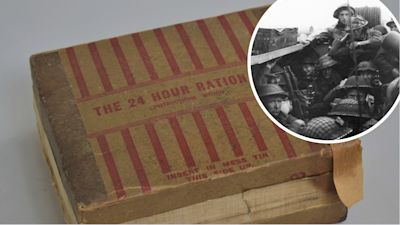World's only surviving D-Day ration pack discovered at Dorset museum

What's thought to be the only surviving Assault Ration Pack in the world has been discovered at a museum in Dorchester.
Assault Ration Packs were issued to British and Commonwealth soldiers for the D-Day landings, and were meant to sustain the troops for an extra 24 hours while supply chains were put in place.
The sealed package was originally found in 2006 but mistakenly labelled as a 1950s item. When it was re-examined for an exhibition, the director of the Keep Military Museum instantly identified it as extremely rare rations from World War II.
Obviously, opening the pack would destroy its decades-old contents so the museum staff enlisted the help of the Fishbourne Roman Palace and its x-ray facilities. The resulting pictures revealed the original contents.
The rations were packed in a waxed cardboard box - sealed to protect them from water and gas. Their small size allowed them to be carried in a mess tin.
They were a lightweight solution to providing soldiers with the 4000 calories they needed a day.
What was in the ration pack?
10 Biscuits
2 Oatmeal blocks
Tea, sugar and milk blocks
1 Meat block
2 slabs of raisin chocolate
1 slab of plain chocolate
Boiled sweets
2 Packets of chewing gum
1 Packet of salt
Meat extract tablets
4 Tablets of sugar
4 Pieces of latrine paper
It is 78 years since the D-Day landings on 6 June 1944 and the Allied invasion of Normandy. They laid the foundations for the victory in Europe and ultimately the end of the Second World War.
Elliot Metcalfe, the Museum’s Director, said: "D-Day is central to the story we tell here because our regiments – the 2nd Devons and the 1st Dorsets - landed on Gold Beach near Arromanches at 7.30 that morning.
"In fact, the 1st Dorsets (with the 1st Hampshires beside them) were the first British infantry to land on D-Day. We’re very proud of that – and we’re thrilled to have found this ration pack which every soldier carried that day. It’s strange to think that this seems to be the only one left in the world."